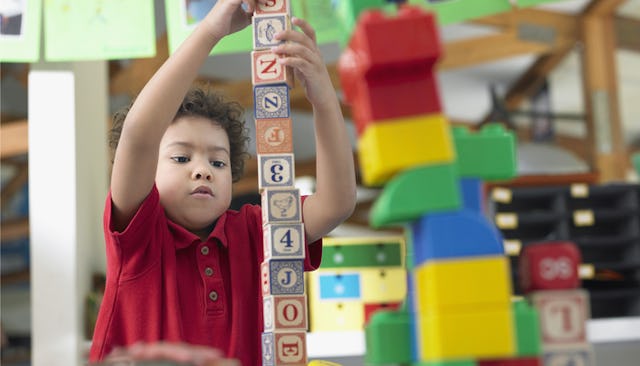Can Everyone Just CTFD About Preschool, Please?

A few months ago, while I was out for pizza with my family, we ran into my kids’ preschool teacher. We all hugged and squealed. She remarked on how big the boys had gotten. I asked her how she was doing. We talked for a while, and when we said goodbye, I got a little choked up.
We were lucky to find the preschool that we did. I hadn’t done much research and quickly chose the school on the recommendation of a neighbor. The fact that it was only two blocks away didn’t hurt either, especially since getting out of the house on time with toddlers is next to impossible. As if the proximity weren’t enough, the teachers were warm and caring; the environment was relaxed and focused on play-based learning. There was plenty of free play, story time, and music class with a woman who can only be characterized as the most patient woman in the world.
There were no tests or drills, no literacy evaluations or math testing. Kids learned how to share, how to listen, how to be a good friend. They were encouraged to explore and experiment and take risks. In other words, they were encouraged to be kids.
I didn’t realize until recently just how lucky we were to find this calm and fun preschool, though one doesn’t have to look far to know that our culture’s philosophy about early education has shifted, and it’s trickling down to the youngest students. In fact, according to The Atlantic, the structure of preschool has changed considerably over the past several years. Unlike my kids’ play-based preschool — which seems to be a bit of a unicorn these days — preschools are incorporating more “seat work” and direct instruction nowadays.
In a study titled “Is Kindergarten the New First Grade?” (spoiler alert: it is), researchers found that the percentage of teachers expecting children to know how to read by the end of kindergarten has risen from 30% to 80% percent in the past two decades. Kids are also spending more time with workbooks and worksheets, and less time with music and art.
With more expected of kindergarteners, many parents are freaking out, and the madness is trickling down to preschool.
“A child who’s supposed to read by the end of kindergarten had better be getting ready in preschool,” wrote Erika Christakis in The Atlantic. “As a result, expectations that may arguably have been reasonable for 5- and 6-year-olds, such as being able to sit at a desk and complete a task using pencil and paper, are now directed at even younger children, who lack the motor skills and attention span to be successful.”
But these new methods are backfiring. Kindergarten used to be a way to ease the transition into school, but now kids are met with unrealistic expectations. Instead of fostering creativity and independence, teachers say kids today seem less curious and less engaged than before.
In other words, we’re setting them up for failure, equipping them with fewer skills, and driving ourselves mad in the process.
This isn’t to say preschool is unnecessary. A good preschool program can build confidence and independence, foster creativity, and enhance communication skills. Not to mention the fact that preschool provides childcare options for working parents and a respite for at-home parents.
So what does a good preschool program look like?
According to experts, the best preschool programs have a few things in common: They let kids talk to adults and other children, foster social and emotional skills, use active learning, encourage meaningful family involvement, and have quality teachers.
“Conversation is gold,” writes Christakis. “It’s the most efficient early-learning system we have.”
In other words, the experts say preschoolers (and any young learner, for that matter) should be encouraged to talk, listen, and question. Soft skills like communication, friendship, and teamwork are invaluable life skills that are far more important than whether your 5-year-old starts kindergarten reading 17 words a minute.
If you ask me — a lowly parent who is very much a non-expert — a good preschool is one that helps children be the best version of themselves they can be. Like the preschool we were lucky enough to stumble into, it builds children up, teaches them to think independently, shows them how to be a good friend, and empowers them to grow and learn. These aren’t just education skills, after all, but life skills.
So I think it is safe to say that we all need to calm down about preschool. These are 3- to 5-year-olds. Let’s let them actually be kids.